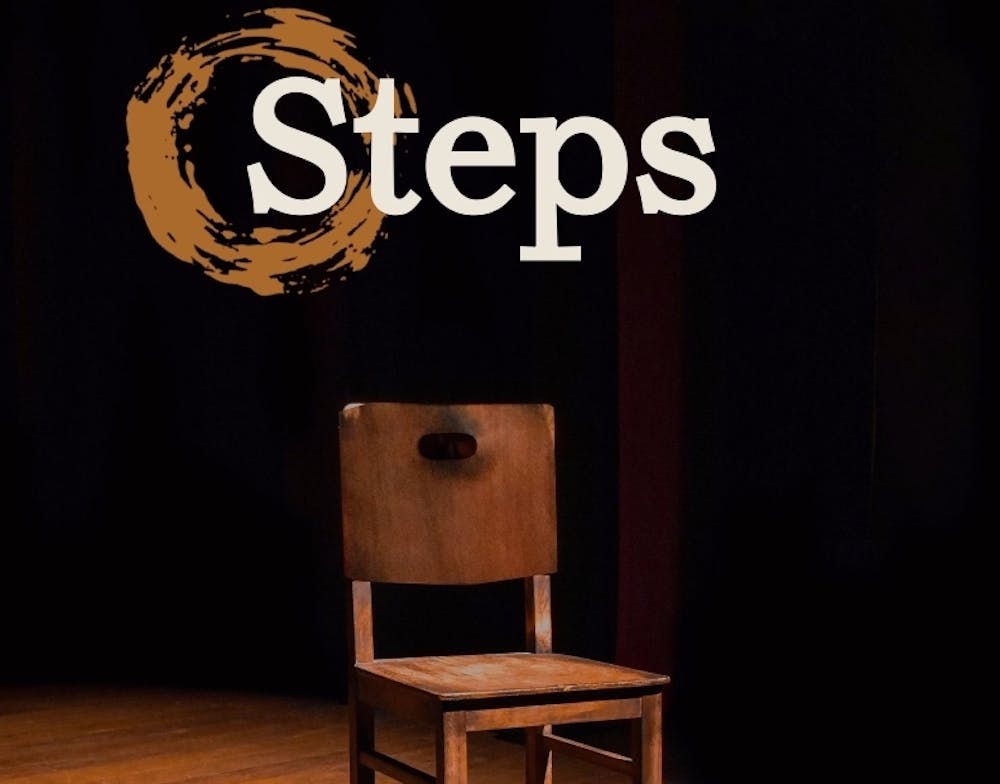If there was ever a perfect location to hold a staged reading, it would be Common House in downtown Charlottesville. Rich, earthy tones and modern art mark the whole winding space. A place dripping in art is extremely fitting for a showcase of artistic writing, acting and feeling. Those who gathered to attend the reading of “Steps” Feb. 3 were scattered around the room in bright, metal chairs — the front row consisting of a teal chaise and other velvet seating accouterments. Gentle conversations took place as the performance neared, and the soft music of Cults and MGMT floated down the stairwell from a bar above.
The modern yet eclectic common area was alight with hurried conversation and at least 15 incredibly different paintings. The whole space exuded warm and inviting energy, just like playwright and graduate student Auntais Faulkner. All the lively talk was slowly hushed when Faulkner began his opening speech.
He first acknowledged the native land the group inhabited, asked for a moment of silence for those affected by substance abuse and the staged reading soon began — different from a fully staged performance, a reading is a stripped-back chance for workshopping plays and stories.
“The essence of the play is read out loud,” Faulkner said. “You don’t have to worry about the spectacle. You can listen to the story.”
As Faulkner mentioned in his introduction of “Steps,” the play contains heavy subject material. The work centers largely on addiction, and other themes such as sexual assault and pedophilia are also mentioned.
Above all, “Steps” is an incredibly real and layered work. Any viewer would be shocked to learn that the bulk of the play was written in the sunny state of Florida during the span of only 10 days and sleepless nights. After a series of edits, an eventual fresh start by Faulkner brought the work closer to finality.
“It had been on my mind so much, it just flowed outward,” Faulkner said.
During the reading, six incredibly deep characters were brought to life, each with their own struggles, varied personalities and pasts. The play does explore addiction, as well as the relapse of a group member — but it is also squarely focused on the humanity of the six individuals.
“It talks about the story behind all of the members,” Faulkner said. “Not through an outside lens painting them as addicts, but from the lens of them being humans.”
This work is deeply personal to Faulkner, who has seen struggles with addiction firsthand. “Steps,” Faulkner hopes, is a story meant to bring people together “so they know they aren’t the only ones suffering.”
Addiction, relapse and the accompanying tension might feel familiar to some, whether by a personal or interpersonal connection. Faulkner’s brilliant writing depicts this pain with loud realness, humor and grace.
The line between stage and audience seemed to blur in the pace of the characters’ interactions intimately seeping into the surrounding world — our world. Morals and messages in “Steps” are easy to carry even once audiences have crossed the threshold of the Common House doors.
In the absence of costumes, lighting and most stage directions, the written material thrived. The elements of fiction present in this work are intertwined with reality and life experience. The cast put on genuine performances which captivated and engrossed — cries, screams and laughs reverberated off the Common House walls and into the hearts of the audience.
Each character is dynamic and loveable in their own jarringly human way. Sheena presents as big-hearted, humorous and bold, while her lifelong friend Reese veils his pain in misplaced rage. Khi chooses a different route and cloaks his struggles in sexual humor — obviously as a result of his age and avoidance. His advances are often directed at Rachel, who is lovingly known as Red. She’s a young mother with a daughter that’s her whole world and driving motivation.
Ashton, who has just transitioned, is trying to heal, process and find a place within the universe that is “Steps.” Lastly, the characters would be terribly incomplete without Steven, the kind group facilitator who doles out hugs when needed and advice when necessary.
“Don’t judge a book by its cover,” Faulkner said. “Patience. Acceptance. Be willing to talk things out and trust. This is the message of ‘Steps.’”
At the end of the reading, a brief question-and-answer period ensued. The cast’s chemistry and relationships were heart-warming to watch during and after the show.
Max Tankersley, director and third-year College student, spoke on the importance of using art and drama to spread awareness of topics like mental health and addiction.
“If you don’t see stories written for you, you should write them yourself,” Faulkner said.
This advice, given to Faulkner from a previous instructor, has followed him throughout his writing, ending in the great culmination of “Steps” — a story of humanity.







